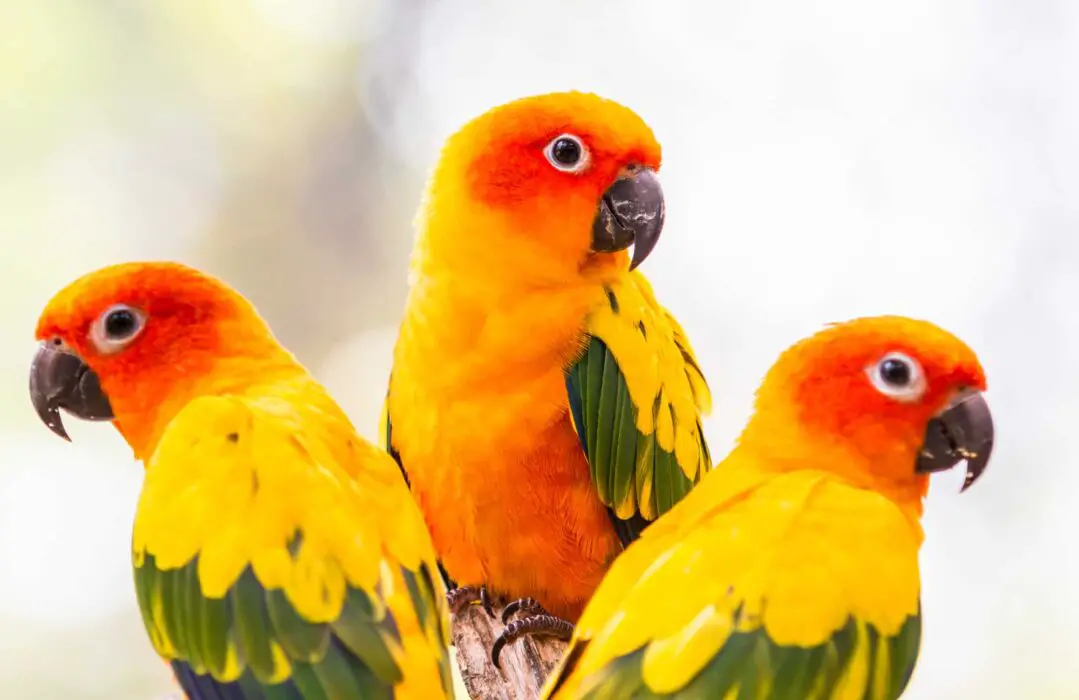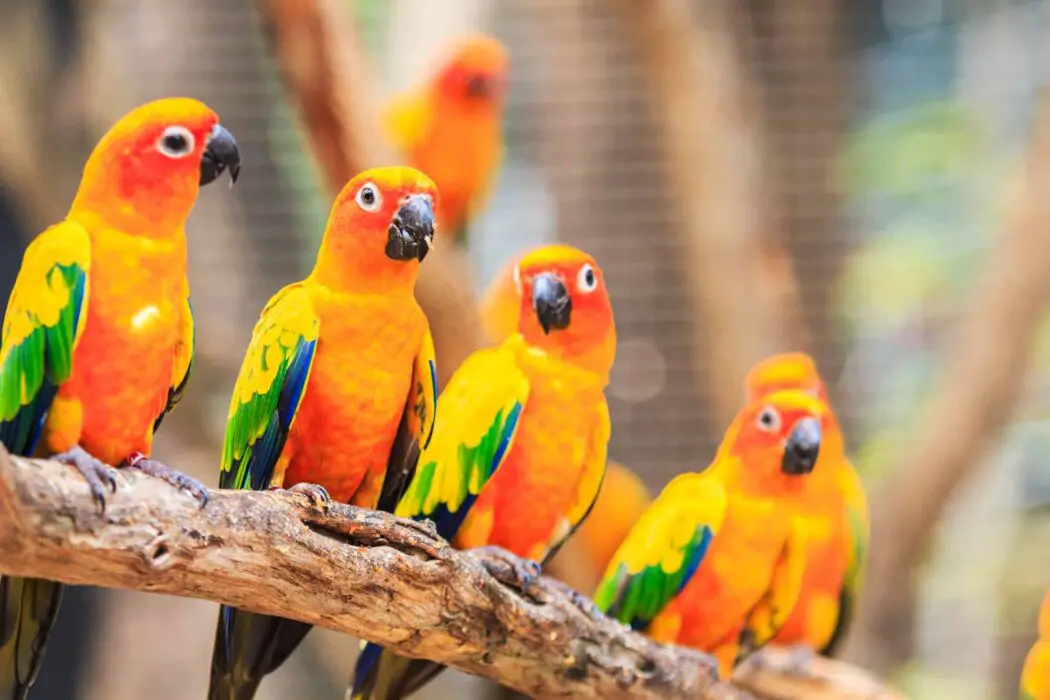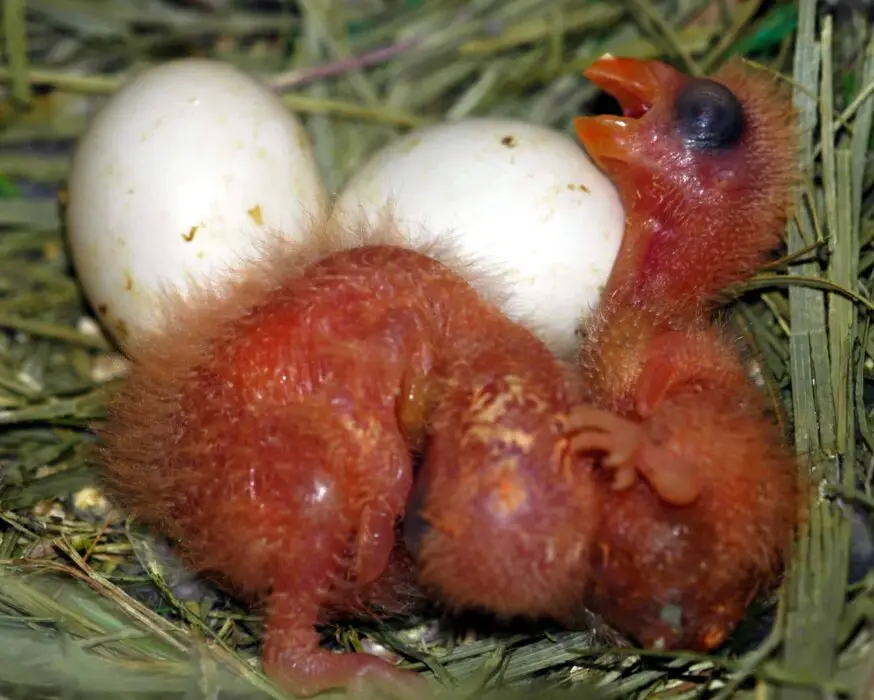Considering the popularity of conures as home pets, it’s crucial to provide accurate information on their health, diet, habitat, lifestyle, and so on. If you consider buying a conure, you should properly research its care needs.
Many people prefer to keep conures in pairs or several birds in an aviary. However, whether they do it purposefully for home breeding or not, you should be prepared for mating rituals (which we’ve discussed before) and laying eggs.
On average, conures lay three-four batches a year. And each batch contains three-five eggs. A bird usually lays them with the interval of one day. The incubation starts as the last egg is laid. It will last for 22-26 days. However, in captivity, breeders recommend limiting the number of batches up to two a year. Also, remember that female conures also lay unfertilized eggs – even without a male bird.
Please, keep in mind the last fact – female conures do lay eggs no matter whether they have a male or not! Many beginner parrot owners get scared at this vulnerable time for the bird. Just think of the farm chickens to get that it’s a natural process. Everything is okay with your bird. At this time, you’ll have to be careful and supportive – this is a hard time for the conure anyway.
Now, if you would like to breed your birds, keep reading to earn more about mating, health, and proper care.
When Do Conure Lay Eggs?

Like many other parrot types, conures have an adolescent phase at around 12-18 weeks. During this time, the bird gets many hormonal changes. Well, just like we humans do. It’s usually a stressful time for the bird. This is what puberty looks like for all animals.
How Long Do Pineapple Conures Live?
However, conures do not enter their reproductive phase until they are two years old! At this time, the birds start mating and soon can lay their first batch of eggs.
Females can also start laying eggs a bit before their sexual maturity at 2. However, do not rush the process. If you breed conures at a young age, it may affect the female’s health. So, wait till 2! Preferably both of the birds.
After entering their maturity, parrots can lay eggs for the bigger part of their lives. Conures can live up to 15-20 years. They can lay eggs for up to 7-10 years.
You’ll have to prepare carefully for your bird’s first mating. Ensure the cage is suitable – it should be large and have additional space for the nesting box. In the wild, conures make a nest on their own. In captivity, they require your help. You can start building a nest with some old feathers, shredded papers, and dry plants. Here’s a little trick – leave some of the material just laying in the cage so that the bird can help build the nest.
Plus, at this time, female conure requires more sunlight. So, spring would suit the purpose the best. In the wild, conures also start mating at the time when days are longer. Natural light is ideal, but UV lamps may be needed if daylight is minimal.
An important thing to remember is a healthy diet. Ideally, take your bird to the vet beforehand and ask for diet recommendations with high nutrient efficiency. Also, remember that soft food encourages laying eggs.
And, lastly, do not rush your bird. Bring them together fr a short period and gradually increase the “date-time.” They’ll need time to bond and mate. Make sure the days are not stressful; give them toys for entertainment and bonding means.
How Many Clutches Conures Have in a Year?

In the wild, conures can have from three to five clutches. However, breeders recommend limiting this number for birds in captivity. Ideally, up to two clutches!
Captive birds don’t have to waste all their resources and energy for procreation. This is not their purpose. Especially if it’s a pet bird, not a breeder one.
Too many clutches in a year take a toll on a bird’s health. Calcium deficiency is one of the most significant issues and other nutrients deficiency. Plus, frequent clutches add stress to your bird. In time, it may lead to depression.
This is why visiting a veterinarian before and after laying eggs is crucial. They will help in tracking the bird’s health and make sure it’s full of life as fast as possible.
Where Do Green Cheek Conures Originate From?
How To Tell If Conure Eggs Are Fertile?

First of all, let’s cover the basics – a female conure will lay eggs even without a male partner. But they are NOT fertilized.
Now, even after mating, there is a change an egg is not fertile. And there are several tricks you can try at home to check whether parrot eggs are fertile.
Note: Do not touch eggs for the first 4 days! You can easily damage them.
- Candlelight. This is a centuries-old trick. You just place an egg to a light source to see whether they are opaque. Yes? Good news; good eggs. Clear and seethrough? Not so good; empty egg.
- Warm water. Another trick is placing an egg with warm water (not hot!). If the egg floats – not fertilized for sure. If it sinks, there’s a great chance it’s fertilized. Be careful, do not touch fresh eggs for this trick!
The incubation period for the laid eggs lasts for around 22-28 days. So if an egg is not hatched after 30 days, it’s safe to say it’s not fertilized for sure.
When the chicks hatch, they usually stay with their parents for around seven-eight weeks. After this time, it’s better to find a new cage for them or find them a new home.
How Often Lovebirds Lay Eggs? Breeder’s Guide
I hope this article answers all your questions about conure mating and laying eggs. Always be sure to visit vets in reparation for the process to get qualified individual help. Be a doting parent and ensure the bird feels safe during the process. Avoid loud noises, give it enough sunlight and darkness for night rest.
I hope your bird gets a healthy batch of chicks!


